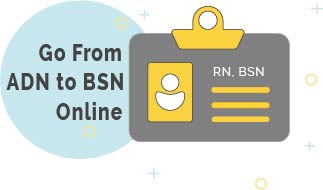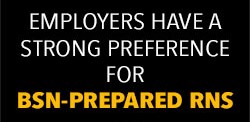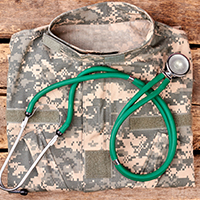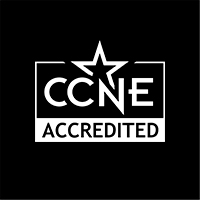Menu
FAQ: Earning Your RN to BSN Degree Online

If you're a registered nurse who was trained in an Associate Degree in Nursing (ADN) or diploma program, there are a number of good reasons to consider a Bachelor of Science in Nursing (BSN) degree. The BSN is rapidly becoming the new standard in nursing education, and more employers now expect RNs to have this degree. BSN-prepared RNs also have a wider range of options when it comes to nursing assignments, raises and promotions.
Returning to school can be challenging, of course, but online RN to BSN programs are designed to address the unique needs of working nurses. You can get two extra years' worth of training, knowledge and clinical instruction in a shorter amount of time than it would take to earn the same degree on campus. And with online classes, you can go to school on your schedule and take breaks when work or life issues are higher priority.
If you've been curious about the BSN degree or the benefits it offers ADN and diploma RNs, this handy guide can help. Just explore the sections below for answers to some of the most common questions nurses have about RN to BSN online nursing programs.
What Is an RN to BSN Degree?

The RN to BSN is a bridge program that helps working nurses complete their undergraduate education. It is tailored to the needs of RNs, providing them with a fast and flexible way to return to school and gain additional clinical skills. The degree also gives ADN and diploma RNs training in evidence-based practice and nursing leadership, enhancing both their skills at the bedside and their career opportunities.
Northern Kentucky University's online RN to BSN program provides working nurses with a convenient and affordable way to earn a bachelor's degree. NKU offers accelerated online courses and flexible scheduling that can help you fit school into your routine.
How Could I Benefit From a BSN?
There are many benefits to earning a BSN, both from a clinical and career standpoint. The additional training in evidence-based practice that a BSN education provides helps RNs build their nursing expertise to take on new challenges in their field. Management-focused coursework also prepares nurses to take on new responsibilities and demonstrate their leadership potential.
There are also practical benefits to earning your degree. Many employers now prefer to hire BSN-prepared nurses or require that applicants complete their BSN as a condition of employment.
What Courses Will I Take in an RN to BSN Program Online, and What Will I Learn?

BSN coursework is built on the core competencies of modern nursing, including evidence-based practice, and it emphasizes that nurses with knowledge in a variety of disciplines can have the greatest impact at the bedside. Core nursing courses in NKU's online RN to BSN program include:
- Models of Care Delivery
- Role Transformation
- Quality Care
- Nursing Research
- Health Informatics
- Population Centered Health
- Genetics
- Leadership
While the courses you take in any RN to BSN program online will cover diverse subject matter, they all have something important in common. Each course allows you to learn more about your role as a care leader and your unique ability to drive positive patient outcomes.
Many students [in health informatics] are familiar with the topics discussed and do not realize how much they already know.
—Crystal Summers, Lecturer in NKU's RN to BSN program online


The leadership component that we give students in our RN to BSN program, and the leadership practicum experience, broadens the horizons for the bedside nurse. They will be able to bring opportunities into their work area that they may have never thought about before.
—Dr. Gannon Tagher, Interim Dean, NKU College of Health and Human Services
Spotlight: Population Health
Population health connects state and local healthcare policy to practice. In other words, it is about collaboration between government, care providers and communities to address healthcare challenges.
Population health is a strong focus throughout all of the nursing programs at NKU, because the work of RNs is essential to addressing the root causes and circumstances of illness. The methods and practices students learn can be applied in many ways, depending on their role. For example, RNs can:
- Help provide basic mental health screening and referral during routine primary care visits.
- Serve on a statewide obesity taskforce doing outreach to specific high-risk groups.
- Collect data on local cancer rates and treatment outcomes, to track diagnosis disparities between poor and affluent communities.
Professors in NKU's online RN to BSN program encourage nursing students to participate in local population health projects, to address the most pressing healthcare issues in the communities where they live and work.
What Are the Admissions Requirements for Online RN to BSN Programs?
For admission to most online RN to BSN programs, you will need to:
- Have an active and unencumbered RN license
- Meet the program's minimum GPA requirement for admission, which usually lies somewhere between 2.0 and 3.0
- Submit official transcripts from all schools you've attended
Some RN to BSN programs require a drug screen and a background check as well. They may also ask that you provide evidence of current CPR certification and nursing liability insurance, or that you are up to date on your immunizations.
NKU's online RN to BSN program requires applicants be in good standing with the last school they attended, meaning they are not on probation or dismissal from another program at the time of application. Applicants do have the option to apply and begin classes before gaining RN licensure, though it must be obtained during the first course. Visit the program page for full admission requirements.
Will I Have to Do Clinicals Again?

You do not have to repeat any of the clinicals that you completed for your ADN or diploma program as part of your BSN degree. However, you will get additional clinical experience as most RN to BSN programs do have a practicum course that allows you to put your training to use and address a healthcare problem in your community.
NKU online RN to BSN students complete a leadership practicum, where they design and implement an interdisciplinary team project focused on issues identified in a specific healthcare setting.
Will I Get Credit for My Previous College Coursework?
Admissions representatives can best evaluate your transfer credits, but coursework from your former school is most likely to transfer if there is an equivalent course at your new school. Accredited nursing programs may not accept transfer hours coming from an unaccredited program, however.
Will I Need to Take Any Prerequisites?

It all depends on your previous college coursework, and your online RN to BSN program. If you have fulfilled all of the math and science requirements for an ADN, chances are good you can go straight into upper-level nursing courses without a problem. If you haven't taken a statistics course, however, or passed one with a grade of "C" or better, you may need to remedy that situation.
At NKU, the only online nursing course with a prerequisite is Nursing Research, which requires completion of a previous statistics course.
Additional general education courses may be required as well.
What Is the Career Outlook for BSN RNs?

The U.S. Bureau of Labor Statistics predicts job growth for RNs will remain steady through 2031, but nursing shortages in some areas of the country are driving higher demand. Employer preference for BSN RNs continues to expand as well, and nurses holding this degree have a competitive advantage.
BSN-prepared RNs also have a wider range of career possibilities when it comes to the different nursing roles they can fill and possibly how far they can advance in the profession. Many experienced ADN and diploma RNs who have risen through the ranks previously without a BSN are now finding they need one to get their next pay raise or promotion, or to do the same nursing job for a different employer.
The BSN degree is becoming a requirement for many nursing management positions as well, and it can also open up these opportunities in departments or units you may not have had the chance to experience. Regardless of your career goals in healthcare, having a BSN puts you in the best position to succeed.
Are BSN RNs More Likely to Get Hiring Incentives and Other Perks?
Yes. Since so many healthcare employers prefer to hire BSN RNs, competition for nurses with this degree can get intense. In addition to signing bonuses, some hospitals are now offering perks such as free housing, or college tuition for both nurses and their children.
Five-figure bonuses are also becoming more common, especially for BSN RNs willing to travel or relocate. More employers are also offering tuition reimbursement and student loan repayment assistance to attract qualified nurses with a bachelor's degree.
Is It Less Expensive to Earn a BSN Online?

It depends on the school you choose, but many students do find that it's cheaper to earn a degree online. Learning online is a more streamlined process, and designed to save you money when you consider the number of semesters you might spend completing the same coursework in a traditional on-campus nursing program. Online RN to BSN programs may also charge fewer fees than their on-campus counterparts.
Cost savings can come from other places aside from fees and tuition as well. Earning a degree online can help students save on other related expenses such as gas and parking. Parents can also skip the babysitter and stay home with their kids while doing schoolwork. These are small savings, but they can add up over time.
The total cost of your degree will be determined by the number of hours required for your program, as well as the number of transfer credits you have. NKU's online RN to BSN program can be completed in 30 credit hours, for a total tuition cost of $9,480.
Will I Have to Pay Out-of-state Tuition?
Many online RN to BSN programs charge in-state and out-of-state students the same tuition rate. Just be sure to confirm this is the case during the application process, as some schools do charge out-of-state students more.
At NKU, all online RN to BSN students pay the same low tuition rate.
Is Financial Aid Available to Online Students?
Yes, as long as you are eligible for aid and attending an accredited school. Once you fill out the U.S. Department of Education's Free Application for Federal Student Aid (FAFSA), a financial aid officer for your program can evaluate your circumstances and tell you more. Online RN to BSN students can use scholarships, grants and loans to pay for their education just as on-campus students do.
Can Service Members and Veterans Use Their Education Benefits for an Online BSN?

Yes. If you are eligible for education benefits through the U.S. Army, Navy, Air Force, Marines or Coast Guard, you can use them to earn your BSN online. All branches of the military require that you attend an accredited nursing school in order to access those benefits.
NKU makes the process simple for veterans and active military members by outlining a series of steps to using your education benefits that you can follow.
I'm a Working Nurse – Do I Have Time for School?

Online degree programs have changed the way working nurses learn and also how many RNs think about their education. A BSN is no longer just an option for those who happen to work the right schedule or have the right timing. It's a path to knowledge and better opportunity that's available to any RN with the passion to pursue it.
When you study online, you don't have to press pause on your life in order to earn a degree. Watch lectures and participate in class when it's convenient for you, whether that's on an afternoon shift break, on your day off, or in the middle of the night when the kids are asleep. Whatever your needs, online study can accommodate them, allowing you to have a life, a job and a degree.
There are generally no synchronous meetings, you do everything on your own time. You have due dates and you can set your own calendar as to when you do your work... it's up to you how many courses, whether you want to go full time or part time, and that is a decision that is made based on your lifestyle. The flexibility is definitely one of the positives of the online environment.
—Dr. Gannon Tagher, Interim Dean, NKU College of Health and Human Services

Can I Finish My BSN Degree Faster Online Than I Could On Campus?
In most circumstances, yes, because many online RN to BSN programs have shorter courses and multiple course start dates through the year. This enables students to learn at an accelerated pace, focusing intently on one or two classes at a time. Students also complete their courses in an average of seven weeks, which is less than half the time required for a standard 16-week semester.
At NKU, you can earn your RN to BSN online in as few as 10 months.
Is My Computer Ready for Online Classes?
You don't need the newest or fanciest technology to take courses online. As long as the computer or tablet you are using is up to date enough to perform a few key functions, you can do well navigating online courses. Just make sure you have a dependable internet connection and that your device is equipped for:
- Streaming audio and video
- Live chats (webcam and microphone)
- Creating papers, spreadsheets and presentations
- Using and storing large files
Will I Be Going to School With Other Students?
Yes, even though your classmates may live in many different parts of the country. This aspect of an online education is a nice bonus for many nurses, because sharing experiences with RNs in diverse locations and circumstances can bring fresh perspective to familiar subjects.
You'll also get a wider frame of reference on problems and solutions in contemporary nursing than you might in a traditional classroom. For example, your online classmates may see different types of illness through the year based on conditions in their region, or different patterns of disease in the patient populations they serve.
Online RN to BSN students also work together on projects and assignments, interact through discussion board conversations, and develop friendships just as students do on campus.
How Do Professors Teach Online RN to BSN Courses?

Many professors prepare modules for students to complete that contain lectures to watch on video, readings, and an assignment or two. Some use notes, slide presentations and interactive technology as well, and video chat for real-time meetings.
Professors may also participate in conversations about lecture and reading material on the course discussion board or ask students to write response papers that engage with subject matter on a deeper level. However your professor conducts the course, the online classroom is a space where you can interact with instructors in multiple ways and work together directly as you learn the material.
—Nathan Francis, graduate, NKU online RN to BSN program


NKU is very student focused. ... If a student chooses NKU, I think they will find that the faculty are really attuned to making sure that our students are successful.
—Dr. Gannon Tagher, Interim Dean, NKU College of Health and Human Services
Will I Be Learning From Professors With Clinical Experience?
Yes. All professors teaching RN to BSN courses have clinical experience, both from earning their master's or doctoral degree and from their own nursing practice. Some professor at NKU also know exactly what it's like to be a working nurse earning a degree online, because they have done it themselves.
I have been a nurse for 34 years. I received my nursing diploma right out of high school, but didn't go back to school to my further degrees until I was 39 and earned my doctorate at 49! I have seven children and worked full time while raising my children and going to school online. ... I started teaching because I felt my experiences and love of nursing would help others to improve the healthcare system.
—Dr. Marybeth Baribeau, Professor, NKU RN to BSN Program Director

I've Been Out of School for a Few Years. Is There Help for Returning Students?
Yes. Schools that offer RN to BSN programs online recognize that many RNs are returning to school after a break, and they may need extra support to get back in the groove of being a student again. Nurses who have not taken online classes before may also need some help getting acclimated to the virtual learning environment. Resources vary by school, so be sure to ask any program you're considering about the specific support services they offer for online students.
NKU's staff, advisors and professors are all dedicated to making sure your online learning experience is comfortable and manageable, and that you have the resources you need to do well. The NKU Writing Center, Library and IT Help Desk all offer assistance tailored to the needs of online students, including online appointments and live chat options for fast and accessible support.
If you're hesitating and you're thinking, 'Well, it's online, I'm not really sure. I'm not familiar or not comfortable with this environment,' remember that we are here to help you. It's what we do.
—Dr. Gannon Tagher, Interim Dean, NKU College of Health and Human Services

Why Should I Look for an Accredited RN to BSN Degree Program?

RNs who graduate from an accredited degree program have a much greater chance of success in the job market and encounter fewer obstacles as they climb the nursing career ladder. Employers want BSN RNs from accredited programs because accreditation ensures the education that nurses receive meets professional licensing standards for the field.
State and federal financial aid programs also require that students enroll in an accredited nursing degree program to be eligible for aid, and many colleges and universities will not accept transfer credits from schools that are not accredited. These are some of the reasons it's important to know a nursing program's accreditation status before you apply.
NKU's online RN to BSN program is accredited by the Commission on Collegiate Nursing Education (CCNE) and the university is also regionally accredited by the Southern Association of Colleges and Schools Commission on Colleges (SACSCOC).
What Does Accreditation Mean?
When a nursing degree program is evaluated as part of the accreditation process, reviewers look at a broad range of criteria to determine whether students are receiving an appropriate education. Here are some of questions they must address:
- Are the teaching methods and curricula up to date and relevant to modern nursing practice?
- Is the program financially solvent and conducting its business in an ethical and responsible manner?
- Are faculty members qualified to teach the courses they are assigned and supervise clinical rotations?
- Does the program engage in continuous evaluation of standards, practices, policies and procedures, and actively work to improve based on evaluation results?
- Does the program respond to complaints in a proactive manner and address issues raised in a timely fashion?
- Are graduation rates and NCLEX pass rates acceptable, demonstrating that students are prepared for professional licensing?
You can learn more about accreditation at the U.S. Department of Education website, where you can also check out the accreditation status of any nursing school you may be considering.